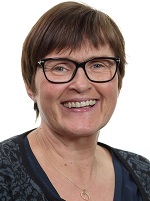Trial Lecture – time and place
See Trial Lecture.
Adjudication committee
- First opponent: Professor Staffan Karlsson, Halmstad Universitet
- Second opponent: Associate Professor Reidun Hov, Municipality of Hamar
- Third member and chair of the evaluation committee: Researcher Anne Kari Tolo Heggestad, University of Oslo
Chair of the Defence
Associate Professor Edel Svendsen, University of Oslo
Principal Supervisor
Professor Ellen Karine Grov, OsloMet
Summary
Increasing numbers of elderly people will lead to more elderly cancer patients in the palliative phase in the years to come. With health policy goals for patients to spend more time at home, the family becomes responsible of the patient most hours of the day. The family is therefore an important resource for both the patient, family members and the health care.
The aims of this thesis where to explore what elderly cancer patients and family members experience as important and difficult in family relationships during palliative phase, including meetings with the health care, and how different groups of family members experience caregiving and access to social support, by family group interviews and self-report questionnaires.
It was important for families to have a positive final time together. The challenges of cancer disease brought different needs for patients and family members, and lack of openness about different needs sometimes made it difficult to understand and meet each other’s needs, which could lead to tensions and conflicts in the relationships.
Family members with different relationships to the patient could experience the care responsibilities and access to social support differently. Spouses, and children and children-in-law of widowed patients were the most vulnerable family members.
The health service was poorly adapted to the families’ needs. The cancer follow-up was exhausting for the patients. Most patients had delegated to their closest family members to be in contact with health services. But the health service lacked systems to involve family members in cancer follow-up.
Cancer in the palliative phase in an elderly family member challenges not only the patient and family members as individuals, but also the family relationships and the family unit. Relational challenges could prevent a positive final time together, make it difficult for the family to help and support each other, and difficult to seek and receive help from the health service.
Additional information
Contact the research support staff.
